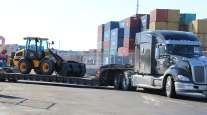Senior Reporter
Some Truck Makers Look to Restart in April

[Ensure you have all the info you need in these unprecedented times. Subscribe now.]
The novel coronavirus’ advance in March froze U.S. commercial vehicle production. Schedules vary, but efforts to restart truck plants are stirring again as the second half of April begins.
Navistar Inc. restarted its truck plant in Mexico and engine plant in Alabama on April 13. Daimler Trucks North America plans to resume output on April 20. Volvo Trucks North America and Mack Trucks remained on hold as of April 15. Paccar Inc. has suspended production through April 20. All declined further comment.
Meanwhile, industry experts said the coronavirus still is raging in various stages around the world, affecting global supply chains.

Mihelic
“The minute you turn that conveyor belt off that is providing all of the supplies to the factory, getting that started back up again is not just one site’s issue. It is multiple sites,” said Rick Mihelic, director of emerging technologies for the North American Council for Freight Efficiency. “Considering all of the components that have to go into a vehicle, considering that domino effect, you have to restart the production line all the way to Tier 2 and Tier 3 suppliers in order to feed the main factory. And that can be very time-consuming.”
Tier 3 suppliers deal with raw materials. Tier 2 suppliers make parts that go into subassemblies for Tier 1 suppliers, which assemble finished components.
The success, or otherwise, of a return to rehiring, training and attaining previous levels of workforce productivity will depend on the weakest link in the supply chain, McKinsey & Co. posted online.
Building trucks after the restarts will be done with new personal protection equipment and testing in place to safeguard workers.
“Compared with a regular startup of production, do you now have the PPE — masks, gloves, cleaning supplies? Even if the cases of COVID-19 may go down, it is not going to disappear in the next six months. You still need to have huge amounts of protective equipment,” said Thomas Kowal, vice president of business development for Seraph, a consulting firm specializing in manufacturing.
This is not a normal recession-recovery situation, not a business cycle event. “It’s a completely artificial event,” FTR Economist Bill Witte said. “Something medical has to happen [to move steadily forward]. We need quick testing to prevent a resurgence.”

Tam
At the same time, it becomes increasingly complex and difficult to attract labor, capital investment and bring that back online in these downturns, ACT Research Vice President Steve Tam said.
“We did in the Great Recession, so it is not that it can’t be done, and we have that as a precedent to go back and look at,” Tam said. “The thing that is different this time, more importantly than the mechanics and all the complicated logistics of how can we do it, is what’s going to cause us to do it.”
Tam said GDP could fall 25% to 30% in the second quarter, and be down 5% for the year.

Dieli
“We are going to take a hit,” MacKay & Co. Economist Bob Dieli said.
He suggested it would be a W-shaped recession, and it is unclear how long it will take the first downward leg of the W to reach its ultimate length. The second leg of the W will come as the supply chain rebuilds and people go back to work, he said. The third leg will come from kinks in the supply chain. The resumption of typical activity could take “about a year.”
Commercial vehicle suppliers were in the midst of a two-year decline in prices, sales and outlook as the coronavirus hit, said Richard Anderson, director of market research for the Heavy Duty Manufacturers Association. “The major challenge for 2020 was [going to be] compensating for the overbuild.”
Preliminary North American Class 8 orders for March fell 50% compared with a year earlier to 7,800, ACT reported, citing preliminary data. Net orders in April could go negative, some suggested, if cancellations surge.
Commercial vehicle suppliers are “more pessimistic than ever before since Q4 2009,” with only 26% positive, Anderson said, citing a recent HDMA survey. “This is for all sectors.”
RELATED: Automakers Will Need Months to Restart Factories
He said 61% of suppliers responding to his survey reported they had closed facilities in North America, even if only temporarily or they had since reopened them. Fifty-two percent reported they had received force-majeure letters from their suppliers explaining closures — and 33% have issued the letters themselves — to explain exceptional circumstances outside their control that interrupted contractual obligations.
While some have likened the effort to winning World War II, Dieli said the nation would get through this pandemic.
“We are smart, resourceful, and this is a solvable problem,” he said.
Want more news? Listen to today's daily briefing:




